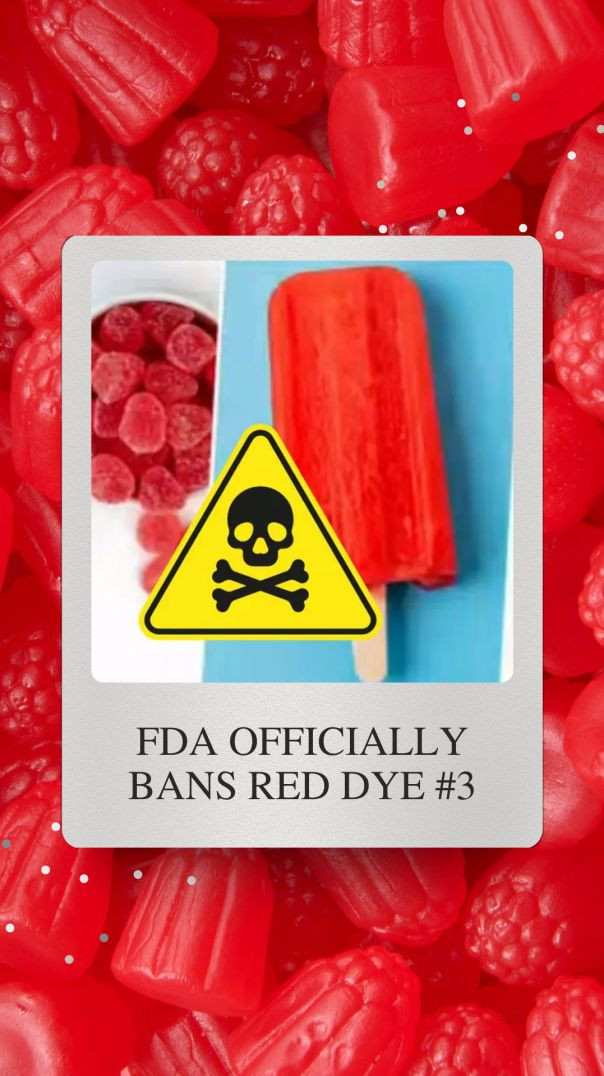Shorts Create

🚨 Red Dye No. 3 BANNED by the FDA! 🚨
🍬 What’s the deal with Red 3?
For decades, this bright pink-red dye has been a sneaky ingredient in everything from candy and baked goods to cough syrups and vitamins. But here’s the kicker—scientific studies linked it to cancer in lab animals as far back as the '80s! It’s been banned in cosmetics for years, yet it’s still been in our kids’ snacks. 🤯
🎥 Why the change now?
Parents, holistic health advocates, and concerned consumers have been raising the alarm about Red 3 for years, citing health risks like hyperactivity in kids and its carcinogenic potential. The FDA is FINALLY catching up, but the fight isn’t over yet! Some industry reps are pushing back, claiming there’s “no credible safety concern.” 🤔
💡 What’s next for your favorite snacks?
Food manufacturers now need to reformulate their products—and some are already turning to natural alternatives like beets, red cabbage, and even insects for coloring. But Red 3 is still lurking in plenty of products, from candy corn and mashed potatoes to children’s nutritional shakes.
🛑 What can YOU do?
Keep an eye on labels, choose snacks with natural coloring, and stay informed. With this FDA decision and changes under new health secretary nominee Robert F. Kennedy Jr., we might see even more moves to cut artificial additives from our food supply.
🌱 It’s time to demand better, safer food for our families. Let’s celebrate this small victory and push for more change! 🎉
#reddye3 #fooddyes #holistichealth #rfk #trump #maha

Some history regarding Joel Salatin and the USDA...
🚨 Joel Salatin Joins the USDA: A New Era for Food Freedom? 🚨
Joel Salatin, the trailblazing regenerative farmer known for his fierce opposition to industrial farming practices, is now stepping into an advisory role at the very agency he's spent decades challenging: the USDA. 🌱 If you’ve followed Salatin, you know he’s been a vocal critic of USDA regulations that he believes crush small farms and push an industrialized model that prioritizes mass production over sustainable, healthy food.
For years, Salatin has clashed with USDA standards that label some of his nature-focused practices as unsafe or even “bio-terrorist.” 🐄 Why? Because he lets his animals graze freely—a move the USDA claims risks disease spread through wildlife interactions. Salatin argues that his pasture-based methods are healthier, both for the animals and for the environment, but the USDA has historically enforced strict rules that favor factory farming over these innovative practices.
Salatin’s opposition to USDA policy goes beyond just the practical; it’s about food freedom. He argues that USDA regulations enforce conformity to large-scale, industrial models, making it nearly impossible for small, sustainable farms to thrive. In his book "Everything I Want to Do Is Illegal," he outlines how many sustainable methods, like processing chickens on-site, are banned or heavily restricted, cutting off local producers and boosting factory farms. 🐔🌾
Now, in a plot twist no one saw coming, Salatin will bring his voice to the USDA’s advisory board. This is HUGE! With someone who has tirelessly advocated for food freedom and sustainable practices now in a position to influence policy, we could see significant changes ahead. Imagine regulations that actually support small farms, promote local food, and dismantle barriers for regenerative farming. Salatin’s dream of environmental stewardship and food sovereignty might be closer than ever.
What do you think—will Salatin be able to shift the USDA's stance on sustainable farming? Let us know your thoughts on this historic move!

What is Curcumin good for?
https://shop.connersclinic.com..../products/curcu-clea




